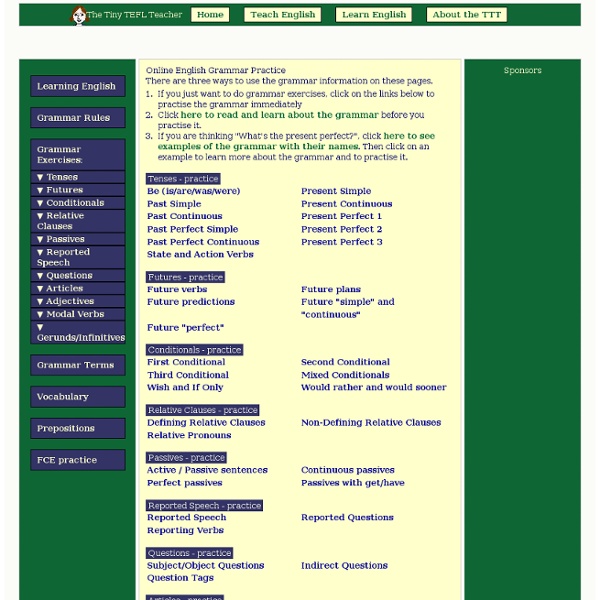



http://www.tinyteflteacher.co.uk/learning-english/grammar-practice.html
Related: GRAMÁTICA • grammarDave's ESL Cafe: Free English Grammar Lessons Adjective Clauses #1 Adjective Clauses #2 Adjective Clauses #3 Adjective Clauses #4 Adjective Clauses #5 Adjective Clauses #6 Adjective Clauses #7 Adjective Clauses #8 Adjective Clauses #9 Adjective Clauses #10 Adjective Clauses #11 Adjective Clauses #12 Adjective Clauses #13 Conditional Sentences #1 Conditional Sentences #2 Conditional Sentences #3 Conditional Sentences #4 Conditional Sentences #5 Conditional Sentences #6 Conditional Sentences #7 Conditional Sentences #8 Conditional Sentences #9 Confusing Words: Bring and Take Confusing Words: Come and Go Confusing Words: Get #1 Confusing Words: Get #2 Confusing Words: Get #3 Confusing Words: Get #4 Confusing Words: Get #5 Confusing Words: Get #6 Confusing Words: Get #7 Confusing Words: Get #8 Confusing Words: Get #9 Confusing Words: Get #10 Confusing Words: Get #11 Confusing Words: Get #12 Confusing Words: Get #13 Confusing Words: Hang Confusing Words: It's and Its Confusing Words: Lend and Borrow
Learn English Grammar Step by Step:Learn English Grammar Grammar is the set of rules that govern the usage of English language. A strong grasp of English grammar is therefore of the greatest importance. Most non-native English speakers make grammatical mistakes while speaking in English. English Tests: Test your English Here you will find tests on all topics of our grammar section that are explained in more detail. English Test: Tenses Present Progressive: Level 1 • Level 2 • Level 3 Simple Present: Level 1 • Level 2 • Level 3 Simple Past: Level 1 • Level 2 • Level 3 Present Perfect: Level 1 • Level 2 • Level 3
Transition Words & Phrases As a "part of speech" transition words are used to link words, phrases or sentences. They help the reader to progress from one idea (expressed by the author) to the next idea. Thus, they help to build up coherent relationships within the text. Transitional Words This structured list of commonly used English transition words — approximately 200, can be considered as quasi complete. It can be used (by students and teachers alike) to find the right expression.
Linking Words — A complete List of English Connecting Words Linking & Connecting Words It is essential to understand how Linking Words, as a part of speech, can be used to combine ideas in writing - and thus ensure that ideas within sentences and paragraphs are elegantly connected - for the benefit of the reader. This will help to improve your writing (e.g. essay, comment, summary (scientific) review, (research) paper, letter, abstract, report, thesis, etc.). Playing with art & language: some personal memories - The Word As Art - Artlink Magazine In the early 1980s I walked into what was then the Third Eye Centre in Glasgow's Sauchiehall Street and saw that the art centre shop was full of giant prints by London-based Scot Bruce McLean. These prints were a wild, neo-expressionist mix of art and text. It was difficult to tell what was a mark representing an everyday object and what was a word representing that object. This was visual poetry, but it was also real poetry, for out of the pizza explosion of colour and line the eye discerned the absurdly beautiful phrase, 'A teacup, a jug, a piece of floor, a certain smile, a new front door.' The marks representing the objects were almost indistinguishable from the words that signified them. And that's about as close to semiotics as I care to go, lest the magic and mystery of the convergence of text and image be analysed out of existence.
Cohesion: linking words and phrases 1.33 Cohesion: linking words and phrases You can use words or short phrases which help to guide your reader through your writing, and to link sentences, paragraphs and sections both forwards and backwards. Good use will make what you have written easy to follow; bad use might mean your style is disjointed, probably with too many short sentences, and consequently difficult to follow. Your mark could be affected either way. The best way to "get a feel" for these words is through your reading.
inklewriter - Education Education inkle is looking to bring interactive stories to the classroom, and give teachers free and simple get-stuck-right-in software to use with their students. From within a web-browser, the inklewriter will let students make and play interactive stories with no programming required.
Adverbs and adverb phrases: position - English Grammar Today We can put adverbs and adverb phrases at the front, in the middle or at the end of a clause. The front position of the clause is the first item in the clause: Suddenly I felt afraid. Yesterday detectives arrested a man and a woman in connection with the murder. The end position of the clause is the last item in the clause: Why do you always have to eat so fast? Writer’s Digest - Writing Prompts Write a scene that includes a character speaking a different language, speaking in a thick accent, or otherwise speaking in a way that is unintelligibe to the other characters. (Note: You don't necessarily need to know the language the character is speaking—be creative with it!) Describe a character's reaction to something without explaining what it is. See if your fellow prompt responders can guess what it is. Write a story or a scene about one character playing a prank on another.
40 Photo-Illustrated Questions to Refocus Your Mind Asking the right questions is the answer… It’s not the answers you get from others that will help you, but the questions you ask of yourself. Here are 40 thought-provoking questions to help you refresh and refocus your thinking: